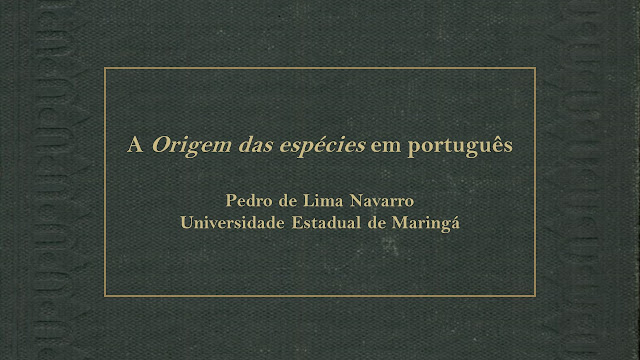Cambridge Companion 6 - Radick
Cambridge Companion to Darwin (2003)
- Radick discute os vínculos sociais e seu nível de influencia na formulação da Seleção Natural e em seu autor;
- Segundo o autor, existem duas teses acerca da sociologia da formulação da Seleção Natural:
- Tese da independência: Essa tese versa que o contexto vitoriano apenas acelerou a formulação da teoria, mas que dado o devido tempo, ela seria formulada em qualquer outro contexto inevitavelmente. Por essa teoria temos que a teoria de Darwin é uma verdade natural que seria percebida a qualquer um que acumulasse observações o suficiente do mundo natural;
- Tese da inseparabilidade: Nesse ponto de vista temos que a teoria é produto do contexto social de Darwin e que não teria surgido da mesma forma.
- Radick afirma que os três principais pontos da vida de Darwin que o levaram a formular a teoria foram: 1) Sua crença na transmutação das espécies; 2) As analogias e comparações entre a seleção artificial e natural; e 3) a epifania ocorrida após a leitura de Malthus;
- Radick questiona:
- "But suppose Darwin had not been immersed in Malthusian conversations in London, and had never happened upon Malthus’ Essay. He might then have continued working on his earlier theory of adaptive species formations. In Darwin’s view at that time, this non-Malthusian theory, while evidentially problematic, did conform to the vera causa ideal. Perhaps he would eventually have published that theory. Or perhaps he would have judged the problems to be so severe that he would have given up on it, and abandoned theorising about species origins altogether."
- Radick tenta resolver a questão levantada pelo fato de Wallace ter chegado a uma mesma conclusão que Darwin, o que deveria confirmar a tese de independência. Dois argumentos são usados para isso: Um versa que talvez ambas as teorias não fossem tão iguais assim, porém o autor não delonga esse argumento frente ao fato das reações de Darwin e seus amigos. O melhor argumento do autor versa que, embora as diferenças da classe social fossem grandes, ambos os naturalistas estavam inseridos na cultura vitoriana e portanto suas ideias são produtos do mesmo contexto social. Para mim esses argumentos são fracos, uma vez que o próprio Darwin mostra que muitos antes dele chegaram perto da teoria em seu esboço histórico, o contexto vitoriano não era tão vital ao meu ver, mas sim a organização sócio-científica, definida por Latour, das Centrais de Cálculo que começou a acontecer a partir das Grandes Navegações;
- O autor discute o conceito de adaptação utilizado por Darwin como algo mais mecanista, uma visão derivade de Paley segundo Radick, para Darwin as diversas adaptações de um ser são como mecanismos. Radick aborda esse conceito frente as duas teses:
- "We might conclude that, thanks to events that brought British natural theology into being, and Darwin into contact with this tradition, Darwin came to recognise what adaptations truly are – the as-if engineered contrivances of natural selection. That recognition would have come sooner or later, since the kind is part of the pre-social order of nature. How the British came to recognise it had no influence on the kind itself. To that extent, the kind is independent of its historical matrix. Or we might conclude, on the contrary, that history, not nature, made the kind what it is. The theory of natural selection assumes a view of organisms and their parts that is peculiar to a time and place. The Darwinian kind ‘adaptation’ is inseparable from Britain in the age of complex machines and counter-revolutionary theology. Other histories produced, and continue to produce, alternative ways of sorting the traits of organisms, ways no more or less in keeping with what we observe. Adaptation is not a natural kind, but a social construct." [grifos meus].
- Mais uma vez, considero o argumento de Radick um tanto forçado. A analogia feita para definir um conceito natural será baseada na vivência social de quem a está fazendo, mas acredito que a teoria que deveria explicar os conceitos naturais não deveria mudar de acordo com a ótica na qual está se olhando a natureza. Tenho ciência de que esse meu pensamento não está muito claro, talvez tenha a oportunidade de refiná-lo no futuro;
- O autor tece diversos argumentos e analisa os motivos de Darwin ter adotado a ideia de Malthus para sua teoria, deixando claro sua preferência pela tese da inseparablidade;
- O autor faz um comentário interessante sobre a mudança na estrutura do campo científico que estaria ocorrendo na época:
- "When Lyell published his three volumes of vera causa geology in the 1830s, the character of the sciences in Britain was beginning to change in a fundamental way. At that time, Anglican clerics alone held the small number of scientific posts at the two ancient universities, Oxford and Cambridge, that dominated the elite life of the nation. Church, state and science thus enjoyed strong institutional links. However, thanks especially to Scottish dissatisfactions and to movements within the Whig party – now reaching out to groups in dissent from Anglican doctrine – those links were coming to be increasingly contested. [...] Lyell [...] saw his books as an attempt to expunge biblical religion from geology. [...] According to Lyell, a scientific, vera causa geology did not admit the existence of catastrophes, the likes of which had never been observed. Lyell’s reforms struck at the English elite and their complacencies. If the reforms succeeded, the views of the cleric-geologists would cease to count as scientific explanations. Just as important, the cleric-geologists, beholden to the Church of England for their livelihoods, would cease to count as men of science."


Comentários
Postar um comentário